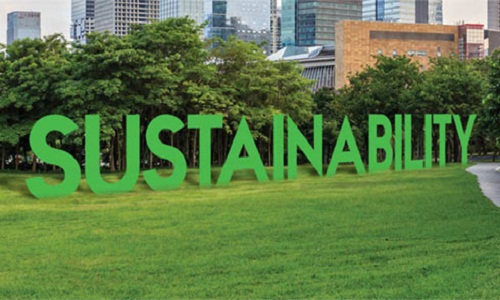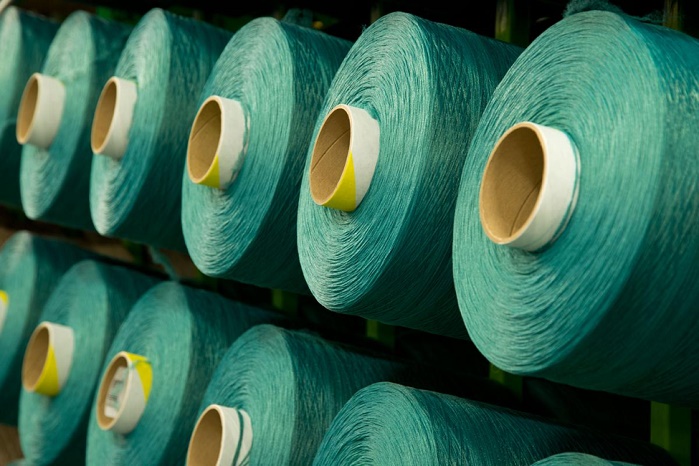FW
Panelists at Texworld USA recently discussed the importance of using preferred fibres. The discussion was divided into four areas: whether the fiber could be traced, if there’s a standard or certification under which it was produced, if a Life Cycle Assessment (LCA) or other third-party assessment was conducted, and whether choosing that fiber can have a positive environmental or social impact.
According to Karla Magruder, Founder and President of Fabrikology International, the traceability of materials can incorporate several standards but the one that’s most used is the Global Recycle Standard, which traces material origin. Organisations like Textile Exchange also have standards that trace where the fiber comes from.
Malvina Hoxha, Manager - Business Development for apparel and knits at Lenzing Fibers, noted that Lenzing’s fibers Tencel Lyocell and Refibra offer fiber identification, and its EcoVera viscose introduced in 2017 is the first viscose fiber that can be traced from fiber to yarn or fabric to end product. Depending on what it is and what your company needs, what’s important to it, you need to be looking at standards that will help you deliver that to your custome.
On LCA or what has become known as “scoring,” Sasso said Buhler concentrates on carbon footprint. This is mainly how much energy is consumed when producing a yarn by investing in the most energy efficient equipment to reduce the carbon footprint, as well as the water and chemicals used. As for having an environmental or social impact, Magrudar noted that there are several methods of making recycled polyester, for example, including mechanical and chemical, and each has its own environmental impacts.
Vidalia Denim will set up a denim production centre in Vidalia, Louisiana. The 900,000 sq . ft. center will produce 15 million yards of denim annually once it commences full commercial operations during the first quarter of 2019. The mill will specialise in lighter fashion weights with an emphasis on stretch and dual core stretch denim.
Vidalia Denim will use “next generation” indigo dye technology that uses less water and manages its power usage more efficiently than any other denim mill in North America. The slasher dyeing technology from Turkey allows for filtration and reuse of process water reducing total water usage by more than 60 percent of a legacy mill. Discharge water will exceed U.S. and EU standards for clean water discharge. Additionally, more than half of the mill’s energy needs will be met from renewable sources.
The company will also use e3 sustainable cotton for its operations. This cotton will be sourced from across the U.S. farm belt from various farmers enrolled in the e3 sustainable cotton program.
The Yamuna Expressway Industrial Development Authority (YEIDA) will set up a ‘textile park’ near the Jewar airport in Greater Noida. The authority has agreed to allot a 200-acre land to 100 textile businessmen for setting up the park. The textile park will give a boost to the industry. It will create nearly 5 lakh jobs; 90 per cent of these employees will be women. The Jewar international airport will help in the import and export of goods
The Yamuna Authority issued a list of 240 units for the park. The industries include those for textiles, telecommunications, X-ray machines, air-conditioning, copper metal parts, cotton, cycle, milk testing and its products. In addition to this, if the authority receives any new and unique type non-polluting proposals, they may consider it for allotment.
The eligible entities could be individual, proprietorship firm, registered partnership firm, registered trust, registered society, private limited company, public limited company, government/semi-government undertaking/department, etc. The scheme is for allotment of industrial plot having an area above 4,000 sq. mt. only.
Premium denim brand, 7 For All Mankind has launched the Luxe Vintage collection, a range of women’s denim that combines high rigidity with comfort and wearability of a stretch jean. The ’90s-inspired collection offers women authentic-looking denim that they could feel good in. This is achieved through a unique fabrication consisting of 82 percent cotton, 13 percent modal, 4 percent elaterell-p and 1 percent spandex.
The Luxe Vintage collection includes four styles—a cropped flare, a straight, an ankle skinny and a pencil cut—in three washes. The Flora is an authentic light shade of blue, the Muse is a rich medium blue shade, and the Femme is a striking dark shade of blue. The collection retails for $189 to $199. The brand will further expand the collection for Spring ’19.
"VF Corp, which owns 27 brands, including The North Face, Timberland, Vans, Wrangler, Lee and Napapijri, went through a complete transformation in 2016 to become a performance-driven, purpose-led business, which is based on sustainability and consumer-centric retail. Martino Scabbia Guerrini, EMEA President, VF Corp, recently stated there is an intensity and fluidity like never before in retail, and brands must change to embrace the new ‘global agenda’. For VF, the idea is to address the issue of scarcity of resources, and to extend the lifespan of its products to make sure that they make the most of them."
 VF Corp, which owns 27 brands, including The North Face, Timberland, Vans, Wrangler, Lee and Napapijri, went through a complete transformation in 2016 to become a performance-driven, purpose-led business, which is based on sustainability and consumer-centric retail. Martino Scabbia Guerrini, EMEA President, VF Corp, recently stated there is an intensity and fluidity like never before in retail, and brands must change to embrace the new ‘global agenda’. For VF, the idea is to address the issue of scarcity of resources, and to extend the lifespan of its products to make sure that they make the most of them. To sustain its growth momentum, Guerrini is focusing on sustainable strategies to create a truly circular economy, whereby products are reused and recycled rather than disposed off. These include schemes for clothing recycling, repair and rental, and the increased digitalisation of the supply chain, alongside the prioritisation of direct-to-consumer channels, and the boosting of the strongest and most energetic wholesale partnerships.
VF Corp, which owns 27 brands, including The North Face, Timberland, Vans, Wrangler, Lee and Napapijri, went through a complete transformation in 2016 to become a performance-driven, purpose-led business, which is based on sustainability and consumer-centric retail. Martino Scabbia Guerrini, EMEA President, VF Corp, recently stated there is an intensity and fluidity like never before in retail, and brands must change to embrace the new ‘global agenda’. For VF, the idea is to address the issue of scarcity of resources, and to extend the lifespan of its products to make sure that they make the most of them. To sustain its growth momentum, Guerrini is focusing on sustainable strategies to create a truly circular economy, whereby products are reused and recycled rather than disposed off. These include schemes for clothing recycling, repair and rental, and the increased digitalisation of the supply chain, alongside the prioritisation of direct-to-consumer channels, and the boosting of the strongest and most energetic wholesale partnerships.
To sustain its growth momentum, Guerrini is focusing on sustainable strategies to create a truly circular economy, whereby products are reused and recycled rather than disposed off. These include schemes for clothing recycling, repair and rental, and the increased digitalisation of the supply chain, alongside the prioritisation of direct-to-consumer channels, and the boosting of the strongest and most energetic wholesale partnerships.
Sustainability at its core
The president envisions technology to become a capability on a VF scale. By 2020, VF EMEA will have retrained all its designers in circular economy strategies, so they can create products that can be recycled and have a longer lifecycle. Recently in the US, The North Face launched ‘Renewed’, a trial where damaged or defective products received at distribution centres are reconditioned, before being resold at a discount online. If the pilot proves successful, the concept would be brought to Europe too. Alongside, 50 European stores across The North Face, Timberland and Vans are participating in VF ‘Take Back’ scheme, in which shoppers donate clothing – made by VF brands or third parties – in return for discount vouchers. They are either resold in the secondary market or downcycled to create materials for other industries. In Europe last year, 4,500 kg of clothing was collected, and VF has committed to increase this by 10 per cent by 2020.
strategies, so they can create products that can be recycled and have a longer lifecycle. Recently in the US, The North Face launched ‘Renewed’, a trial where damaged or defective products received at distribution centres are reconditioned, before being resold at a discount online. If the pilot proves successful, the concept would be brought to Europe too. Alongside, 50 European stores across The North Face, Timberland and Vans are participating in VF ‘Take Back’ scheme, in which shoppers donate clothing – made by VF brands or third parties – in return for discount vouchers. They are either resold in the secondary market or downcycled to create materials for other industries. In Europe last year, 4,500 kg of clothing was collected, and VF has committed to increase this by 10 per cent by 2020.
Anna Maria Rugarli, EMEA’s senior director for sustainability and responsibility, VF, says new generations are less interested in ownership, but they want to have access and to experience. This business model brings it to them – it’s a new way to provide services to stay relevant to them. Some of the other initiatives in this regard include ensuring 50 per cent of the PET and nylon used is from recycled sources, and all cotton will be sustainable by 2025. Brands are also encouraged to work closely with relevant local communities.
Partners in progress
Lee Bagnall, MD, Blacks Outdoor Retail, a key The North Face stockist, observes VF is progressive and has a clear strategy in terms of the different channels it wants to participate in. Sustainability will become more important over the next few years. They are very good at reinventing themselves and being at the forefront of everything they do, making sure they are relevant. VF is also collaborating to raise brands’ profiles, focused on designers that share its sustainable ethos. Going ahead, it plans to acquire new brands too and that the latest purchase of New Zealand outdoor and sportswear brand Ice Breaker is the blueprint for future deals and was the first purpose-led acquisition for the business.
The optimistic president advices other retailers not to be afraid of change, be afraid of not doing it. Keep it simple. You need to create something that is focused and make it part of the narrative. The language is the biggest missed opportunity in many businesses. Companies not only have to transform, they have to become better at telling how they are doing it. In every industry, it’s clear that whoever wasn’t open to change and embracing new generations is gone. It’s about keeping this new generation of consumer conversation open to determine what your internal culture change should be, before it’s too late – before someone wakes you up with a bomb.
Vietnamese associations have proposed stricter control over exports to Chinese markets due to the high tariffs in the US market. They have urged association members to apply the cross-control mechanism to local exports to prevent possible negative impacts.
Chinese enterprises have raised their orders for products manufactured or processed in Vietnam which they plan to export to the US. This will bring short-term benefits to Vietnamese enterprises but may cause a surge in export revenue from these products, thus posing a high risk of increased tariffs imposed by the US Department of Commerce (DOC).
Thus, if the DOC detects Vietnamese enterprises outsourcing products to their Chinese partners, not only will the outsourcing firms face high duties but their peers in other sectors will as well. Vietnam is the second-largest supplier of textile-garment and leather-footwear products to the US after China. Therefore, China may ship its products to Vietnam to complete simple stages and then export those products stateside, bearing the labels of Vietnamese enterprises to avoid high tariffs.
The Pakistan Readymade Garments Manufacturers and Exporters Association (PRGMEA) says, the country’s textile value added sector is facing serious economic hardships due to volatile exchange rate. Pakistan is facing multiple economic challenges, including Pak rupee devaluation, slow foreign inflows, depleting foreign exchange reserves, higher inflation. These economic problems can be mainly attributed to lower exports and higher imports.
Despite massive efforts from the government, Pakistan's total exports could hardly reach $23.22 billion as against imports of over $60.8 billion by end of fiscal year 2018. Among overall exports, the share of the textile sector is merely $14 billion. Depreciation of Pak rupee has made imported raw materials more costly. The previous government had announced Rs 180 billion relief package for the export sector, but it could not be delivered completely due to bureaucratic hurdles. Now, a fresh bailout package for the textile sector has been called for.
Target has selected six Indian startups as part of its accelerator program. The startups will be part of a four-month intensive program focused on transformative and technology-driven ideas to create solutions for today’s rapidly changing retail environment.
They will work on developing customised retail solutions using emerging technologies such as Artificial Intelligence, Machine Learning, computer vision, natural language processing and analytics. They will have access to Target mentors, tools, resources and operational support as well as workspace at Target's Bangalore offices.
Target is an US-based retailer. The startups will get the opportunity to implement their solutions in real-world scenarios and measure the results in real time. The selected startups are Kenome, Point105-AR, Quilt.ai, Moodboard, Eder.ai and StyleDod.
Kenome uses AI to help enterprises make sense of dark data using deep learning, natural language processing and knowledge graphs. Point105-AR provides a holistic 3D asset management solution for augmented reality experiences. Quilt.ai uses AI tools to build a large research and action platform.
Moodboard provides a tool that leverages AI to provide insights on product performance trends that aid in future product design. Eder.ai offers a distributed computing platform with Blockchain-grade encryption which enables secure AI to help scale research and unearth new intelligence.
StyleDod provides a tool that automatically converts floor plans into 3D designed rooms, fully furnished with merchandisable products.
Singapore recently became the third nation after Mexico and Japan to ratify the Comprehensive and Progressive Agreement for Trans-Pacific Partnership (CPTPP). The agreement is likely to reduce market barriers as well as foster trade in a combined market of 500 million people with a gross domestic product of $10 trillion (S$13 trillion).
The deal establishes rules in new areas, such as e-commerce, and will enter into force 60 days after six of the 11 signatories ratify the agreement. Mexico was the first to ratify the agreement in April, with Japan following suit on July 6. The remaining countries in the bloc are Australia, Brunei, Canada, Chile, Malaysia, New Zealand, Peru and Vietnam.
A revision of the original Trans-Pacific Partnership, CPTPP will complement Singapore's existing network of bilateral free trade agreements. It will strengthen trade among countries in the Asia-Pacific, resulting in a more seamless flow of goods, services and investment. The agreement also signals Singapore's commitment to trade liberalisation and a rules-based trading system.
The Heriot-Watt School of Textiles and Design in Scotland connects learners to live industry projects and helps them work with long-standing trade bodies, The school offers five core postgraduate subjects that include the MA Interior Architecture and Design, MA Knitwear (Design, Heritage and Production), MA Fashion and Textiles Design, MSc Ethics in Fashion and MSc Fashion Textiles Management courses.
The MA Interior Architecture and Design programme offers its students an opportunity to work on exclusive projects with the British Institute for Interior Design. At the same, the MSc Fashion Textiles Management Course enables them to attend trade fairs and global exhibitions including Première Vision in Paris.
The school also hosts annual degree shows to exhibit the latest student ensembles. At the 2018 Degree Show, final year learners got a chance to celebrate the end of an era with a captivating catwalk show and vibrant displays. The event also attracted press photographers and representatives from Radio Borders and ITV Borders.











